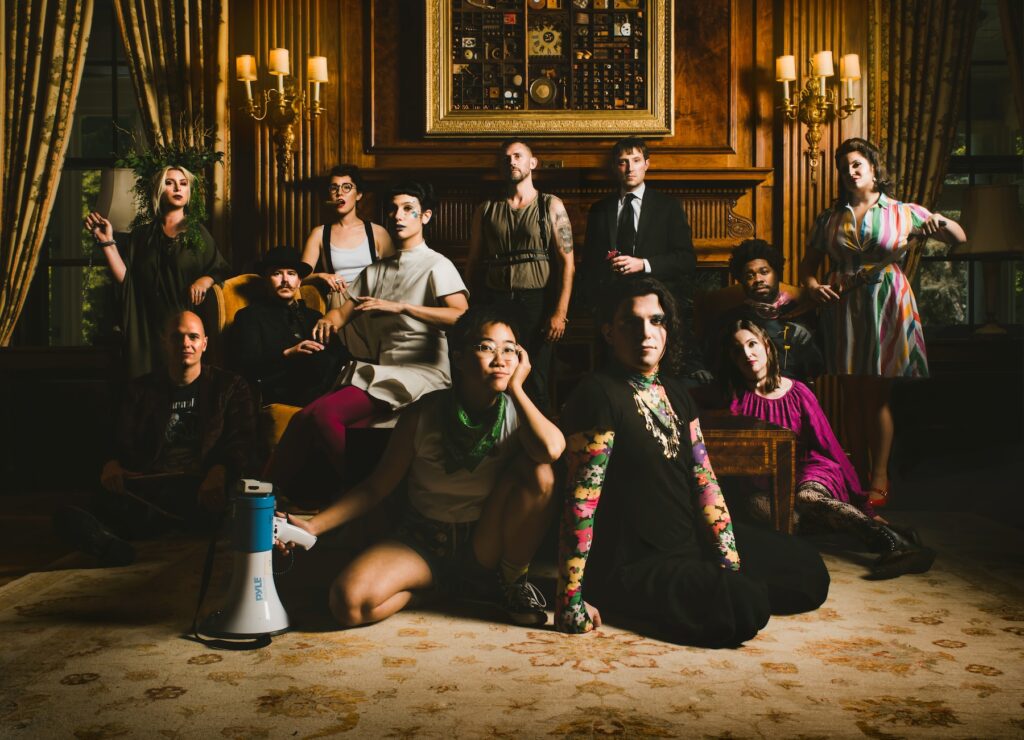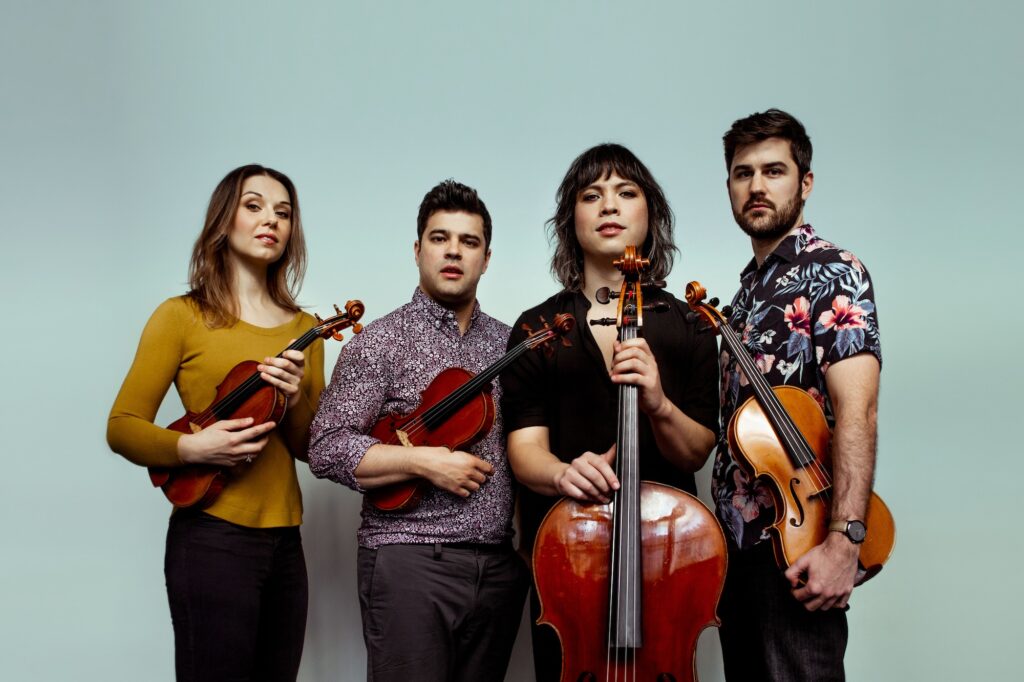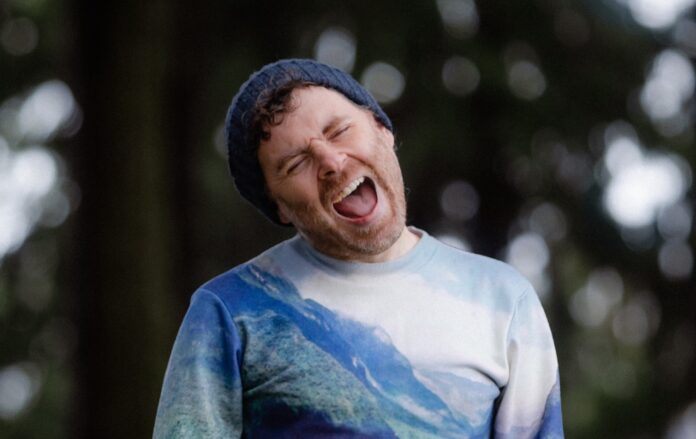SF Performances’ annual PIVOT Festival (Jan/24-26, Herbst Theatre, SF) mixes contemporary compositions with classical ones in a musical quest “driven by a philosophy of innovation, creativity, and artistic excellence that pushes the boundaries of the traditional concert experience.” That’s a lofty aim that cries out for some grounding in the material, and the SFP team could not have chosen a better composer-curator to head up the ninth installment than Gabriel Kahane, whose politically and socially engaged oratorio “emergency shelter intake form” knocked me off my rocker when it was performed last February by the SF Symphony.
That emphatically democratic work was based on the institutional language of shelters for the unhoused and others facing housing emergencies, as well as the direct experience of those undergoing housing instability and other crises. It was impossible to be unmoved when a vast community choir including people living in local temporary housing and SROs stood up in Davies Symphony Hall and spoke their truth through Kahane’s composition, electrifyingly humanizing the housing crisis.
Kahane’s own music takes a kind of folkloric indie approach to composition (he’s collaborated with Sufjan Stevens and Rufus Wainwright), which retains some classical hallmarks while putting focus on contemporary storytelling, with an accessible yet knowing underground aesthetic and sharp political critique. For PIVOT Festival, he’s put together three nights of close friends (Attacca Quartet, Roomful of Teeth) performing music from all over the timeline, from Ravel and François and Louis Couperin to Caroline Shaw, Paul Simon, and Kahane himself.

As he told me in a phone interview about the PIVOT Festival, conducted while he was preparing to leave for Europe for the London debut of “emergency shelter intake form,” he views music, especially after the “pivot” of the pandemic, as a supremely social act that unites audience and players into one generous community.
“I think for me a lot of how I approach music now actually grew out of Lewis Hyde’s book The Gift, which I read during deep COVID,” Kahane said. “It was originally published in 1983, and it’s this book that every generation of artist continues to discover. It’s a wonderful book, all about the intersection of gift-consciousness and gift economies with art. The central premise of the book is the idea that art, at least in this country, exists in both a gift economy and a market economy. Hyde writes in the beginning of the book, ‘Art can’t exist without the market, but where there is no gift, there is no art.’
“What he means is the reciprocity that occurs between the maker and the receiver, and how we as the makers really rely on that presence of the audience to be made whole. At least that’s how I operate. It extends beyond the relationship of artist and audience, the little community that exists onstage. The other Hydean observation that I bring to my practice is this beautiful thing that he says about how, ‘in societies that practice gift-consciousness, as a gift circulates through a community, it articulates the community.’ Which is to say you know who is in the community based on who receives it.”

How do those principles apply to live performance? “For me, it translates to this notion that any time a piece of live performance occurs, there is a community being activated in that space. In a way it’s giving fancy spiritual language to something that is obvious, but coming out of the very severe moments of the pandemic, I think it took on a deeper meaning. Doing ’emergency shelter intake form’ last February felt heightened for all these reasons.”
Did those principles directly apply to the structure and selections of this year’s PIVOT? “In terms of the PIVOT Festival, more and more I’m just interested in making music with people I love and want to spend time with,” Kahane said. “That is really the case for [chamber ensembles] Attacca Quartet and Roomful of Teeth. As much as I love working with orchestras, there’s something very factory-like about how you rehearse with an orchestra, because of the logistics. Whereas with chamber ensembles you can be more organic and intuitive.
“In the course of writing one of the pieces on the program, ‘Elevator Songs,’ which SF Performances co-commissioned, we spent an entire day, Roomful of Teeth and me, in a room where they just told me stories about their lives. I had come in with a bunch of prompts, but we spent six hours just talking. That the kind of thing you can’t do with an orchestra, it would cost you $50,000,” he laughed.
That agility of sociability runs though time as well as space. “I think of this festival as being very social. The programs are expressive of a larger community of composers, and also a conversation that is taking place across generations and across time. It’s not strictly new music: There’s Ravel, there’s two Couperins—the mini-dynasty of Louis and François—I’m super excited about this blending of different eras with these tremendous artists.
“The festival was pitched to me in July 2021, and it was that moment when people were finally getting vaccinated, and it was before Delta, and we had that two-week period where we had this fantasy that it was all over [laughs] and so it was interesting to be dreaming up this program at a moment of extreme optimism. Which was then, of course, brought down to earth by reality. But the spirit of that optimism, I hope, is still alive in the way we’ve chosen the music, and the love we have of performing it together.”
PIVOT FESTIVAL Jan/24-26, Herbst Theatre, SF. More info here.







